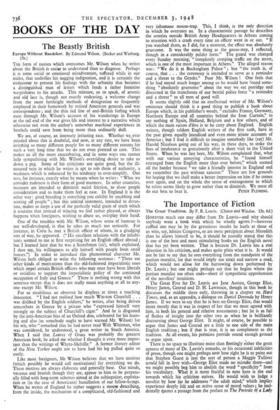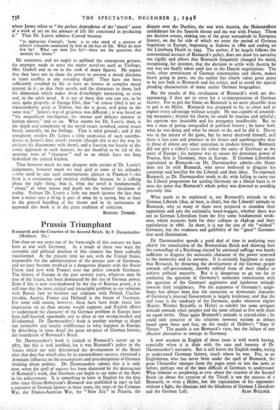The Importance of Fiction
The Great Tradition. By F. R. Leavis. (Chatto and Windus. 12s. 6d.) - HOWEVER much one may differ from Dr Leavis—and why should anybody want a book with which he wholly agrees ?—however ruffled one may be by the gratuitous insults he hurls at those of us who, say, admire Congreve or are more percipient about Meredith than he allows himself to be, it should be roundly stated that this is one of the best and most ...stimulating books on the English novel that has yet been written. That is because Dr. Leavis has a real direction in his criticism and makes quite plain what it is. It would not be fair to say that he sees everything from the standpoint of the puritan moralist, for that would imply too strait and narrow a road, which would not allow .for the burrowing down performed by Dr. Leavis' but one might perhaps say that he begins where the puritan moralist too often ends—short of sympathetic apprehension of the novelists' intuitions.
The Great Five for Dr. Leavis are Jane Austen, George Eliot, Henry James, Conrad and D. H. Lawrence, though in this book he discusses the middle three only, throwing in a chapter on Hard Times, and, as an appendix a dialogue on Daniel Deronda by Henry James. If we were to say that he is best on George Eliot, that would mean merely that it was in respect of her that we most agreed with him, in both his general and relative assessments ; but he is as full of flashes of insight into the other two as when he is brilliantly discoursing about George Eliot. It might, of course, be possible to argue that James and Conrad are a little to one side of the main English tradition ; but if that is true, it is no compliment to the tradition. At all events, his premises provide sound enough ground to argue upon. There is no space to illustrate more than fleetingly either the great aptness of many of Dr. Leavis's remarks, or his occasional infelicities of prose, though one might perhaps note how right he is to point out that Stephen Guest is just the sort of person a Maggie Tulliver would fall in love with—George Eliot made no mistake there—and we might possibly beg him to abolish the word " specificity " from his vocabulary. What it is more fruitful to note here is the end towards which his criticism strives. He would wish to judge a novelist by how far he addreases ■" the adult mind," which implies experience deeply felt and an active sense of moral values ; he inci- dentally quotes a passage from the preface to The Portrait Of a Lady
where James refers to "the perfect dependence of the moral' sense Of a work of art on the amount of felt life concerned in producing it." Thus Dr. Leavis admires Conrad because
"to 'appreciate Conrad's 'form is to take stock of a process of relative valuation conducted by him in the face of life. What do men ' live by? What can men live by?—these are the questions that animate his theme."
He contemns, and we ought to applaud the courageous gesture, the attempts made to erect the minor novel:sts such as Trollope, Mrs. Gaskell and so on to the rank of major figures. He argues that they have not in them the power to present a moral dilemma or inner conflict at any revealing depth. They have not been sufficiently troubled by life to have an intense or complex moral interest in it ; so that their novels, and the characters in them, lack the dimension which makes them disturbingly interesting, or even real, to the adult mind. It is not of these that you can say, as he says, quite properly, of George Eliot, that "of course [she] is not as transcendently great as Tolstoy, but she is great, and great in the same way." James's way of greatness was different ; it was based on "his magnificent intelligence' his intense and delicate interest in human nature," and so on. What counts for Dr. Leavis, then, is the depth and complexity of the moral issues involved, moral issues based, naturally, on the feelings. That is solid ground ; and if the standpoint renders Dr. Leavis a little suspicious of such unortho- doxies as James's later novels present (though this is not the way he analyses his discontents with them), and a fraction too hostile to the comic approach to such matters, we are thankful to be rid of the spurious tests of " character " and so on which have too long bedevilled the critical kitchen.
Thus however much we may disagree with certain of Dr. Leavis's judgements, however much we may gird at some of his attitudes —why need he cast such contemptuous glances at Flaubert ?—his book is a continuous and exciting challenge because he is talking about the right thing, that is, what the novel is fundamentally "about," of what nature and depth are the writers' intuitions of reality. Perhaps Dr. Leavis a little too much ignores the fact that how a writer says a th:ng is parr of what he is saying, but at least in the general handling of the theme and in its seriousness of approach this book is in the great tradition of criticism.
BONAMY DOBRAE.



































 Previous page
Previous page